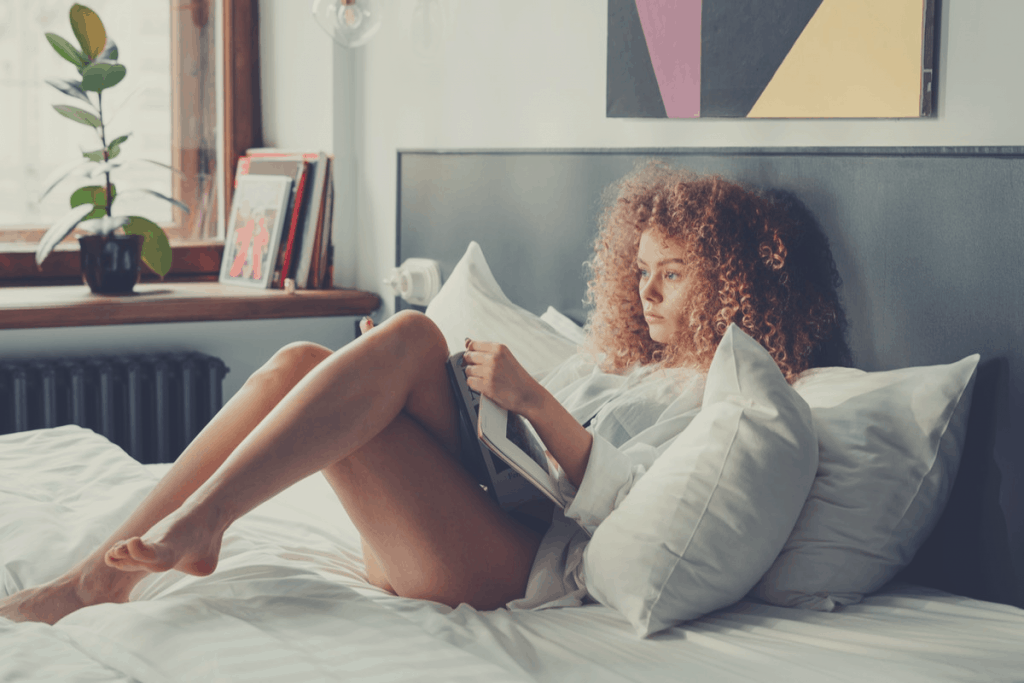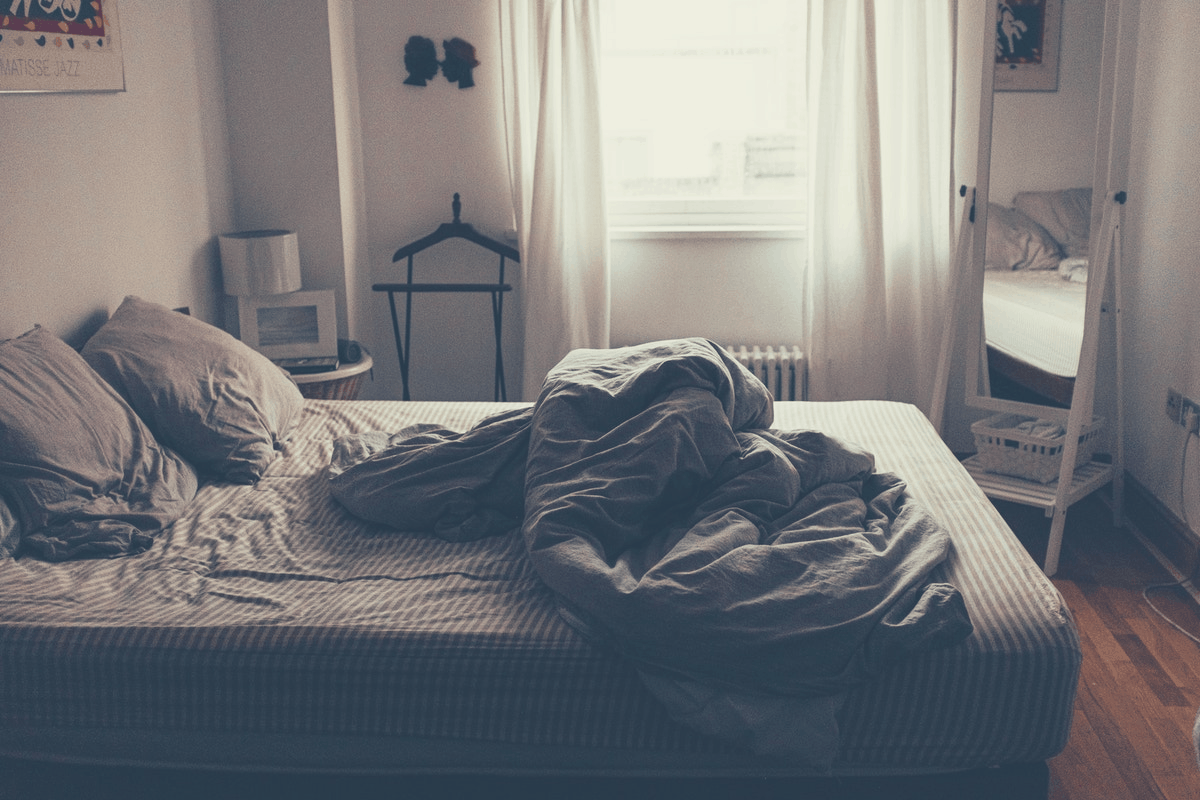Sleep quality can be affected by so many factors, including the amount of caffeine you consume and the tidiness of a bedroom. Luckily, there are things you can include or exclude from your evening routine to improve your chances of getting quality sleep. One or two tweaks to your bedtime routine might be all you need to get better slumber. Here are a few simple tweaks that can improve your sleep quality.
18 Tips on how to go to Sleep
1. Avoid Reading E-Books
Increased use of mobile devices and internet accessibility has contributed to the continued popularity of e-books. E-books could be ideal for reading before going to sleep due to their black screens. However, recent research on young adults showed that participants who read an eReader before bed took longer to fall asleep than those who read a printed book. It also found that reading an e-book before bed resulted in less alertness in the morning and more alertness during the evening. The findings suggest that reading an e-book at night could hurt sleep quality.
2. Take a Hot Shower or Bath
One relaxing way to prepare for bed is taking a hot shower or bath. It can also help regulate your body temperature as you get ready for bed. The benefits of taking a hot shower tend to outweigh cold showers by far. For example, a hot shower can relax your muscles and promote better sleep.
3. Listen to Music
Listening to music before you go to bed can be relaxing. Preferably choose calm music and not the type of music you would dance to during a Saturday evening. Still, music may not work for everyone. Response to music depends on your preferences. If you are using Spotify, a tip from me is to browse their categories and select sleep. This list always makes me yawn.
4. Practice Breathing Exercises
One popular relaxation technique before you go to bed is practicing breathing exercises. Taking deep breaths can help you de-stress and take your mind off anxious thoughts. A popular option that has proved to be a powerful tool for preparing for bed is 4-7-8 breathing. It involves taking a 4 seconds deep breath, holding it for 7 seconds, and exhaling it for 8 seconds. Deep, rhythmical breaths are relaxing and can result in better sleep. If you want to read more, I have written an article about it here.
5. Optimize the Room Temperature
A too cold or too hot room can affect your ability to sleep. The temperature levels at which a room feels comfortable can vary across individuals, so consider experimenting with different temperature levels. However, as I have written before and done research on, the best/most popular bedroom temperature is 16-19 Celsius/60 to 67 Fahrenheit and does improve sleep quality.
6. Work on Your Eating Habit
Foods and drinks that you take in the evening can have an impact on your sleep quality. Your ability to sleep can be impaired by eating a heavy meal one hour before going to bed. Digestion can take 2-3 hours, so taking a heavy meal an hour before going to bed can cause feelings of nausea and discomfort. Heavy meals tend to slow digestion in some people. So, it is wise to allow the body enough time to digest and relax before going to bed. The time it takes to digest a meal can vary from person to person.
7. Meditate
Meditation is one thing you should do before sleep as it helps alleviate the anxiety that often disrupts sleep. Meditation helps distract a person from busy thoughts, calm an anxious mind, and promote quality sleep. A recent study by Black, Breen, Irwin from Jama Network, found that individuals who practice mindfulness tend to fall asleep more easily than their peers. Meditation can easily be done by everyone since it does not need to cost anything and is easy for your body!
8. Avoid Caffeine
Caffeine can disrupt sleep patterns and stimulate wakefulness. I would recommend you to avoid caffeine 4 hours before going to bed, it works all right for me and should do for you as well. But for some people, consuming caffeine at any time of the day could cause sleep disruption. So, if you suspect you are one of those, it may be best for you to avoid caffeine altogether.
9. Exercise During the Day
Workouts can have a positive impact on the quality of sleep. Recent research on adults with sleeping difficulties found that high intensity or moderate workout sessions led to improved sleep quality. It also found that people who had high-intensity exercises took their sleep pills less frequently than those who didn’t.
10. Don’t Nap During the Day
Daytime naps that last longer than 2 hours can cause circadian rhythm disruption. A study on college students found that students who napped longer than 2 hours during the day had lower sleep quality than those who never slept. Students who had a poor night’s sleep are often tempted to take a long nap during the day. So, avoid long naps during the day as they can disrupt your bedtime routine.
11. Stick to Your Sleeping Pattern
One of the bedtime behaviors that can disrupt your evening routine is going to bed at different times during the week. Irregular sleeping patterns tend to interrupt your internal process, which, interferes with sleep quality. Internal processes comprise mental, physical, and behavioral changes that occur within 24 hours. One role of the internal process is to prepare the body for sleep. The process is heavily influenced by hormones that induce wakefulness or sleep. A regular sleeping pattern helps the body to predict when to induce insomnia and sleep.
12. Read a Book
One way to relax your mind after a long, stressful day is by reading an engaging book. Reading can help ward off anxious thoughts that could be causing sleepless nights. However, I have read some books that kept me up to the middle of the night. Which is not our goal for this article. If you are an emotional person, I would recommend you to skip reading books with lots of emotional content.

13. Keep the Lights Off
Light is one of the cues that influence the hormones that help the body and brain judge when it is time to sleep. Keeping your bedroom lights off before you get to bed can help you fall asleep significantly easier.
14. Avoid Excessive Consumption of Alcohol
Consuming a lot of alcohol before going to bed can affect your sleep. Alcohol can induce feelings of nausea and restlessness and delay the onset of sleep.
15. Keep Off Noisy Places
Noise can be distracting and can lower sleep quality and delay the onset of sleep. For example, when I have been sleeping at the hospital, it took me longer to fall asleep than at home due to high levels of noise and distractions.
16. Make Your Bed Comfortable
Sleeping on supportive and comfortable pillows and mattresses can improve sleep quality. A comfortable mattress may be expensive, but its long-term impact on your sleep quality could be worthwhile. A high-quality mattress offers comfortable sleeping positions that are essential for sleep and your health. Frequent changes in sleeping position can cause distraction, but finding the right spot faster can improve your sleep quality. My own best sleeping position is on the side, what is yours?
17. Take Melatonin
The body produces melatonin to induce drowsiness and sleep. Taking it as a supplement can make it easier to fall asleep. Melatonin can also be useful for relaxation, especially when adjusting to new time zones or traveling. It also helps normalize the inner process, with a hormone that induces drowsiness and sleep. However, some countries require you to have a prescription before using melatonin, which is readily available online and in stores. From what I have read, experts recommend taking 1-5 mg of melatonin at least 30 minutes before going to bed. Read the package instruction before taking any medical drugs. It is recommendable to start with a low dose as you assess your body tolerance. It is also advisable to consult a healthcare provider before using melatonin as it can alter brain chemistry.
18. Aromatherapy
Aromatherapy, also known as a healing process with natural plants and oils, is a proven way to induce sleep and relaxation. An example of a popular oil that aids in improved sleep quality is lavender oil. A recent study on college students found that applying lavender oil on the body before going to bed can make it easier to fall asleep. Lavender oil users are also likely to be more energetic after waking up.
Conclusion
Having a full night’s sleep is important for your body and well-being. If you are feeling stressed out over work or school, the best you can do is to get a steady 8 hours of sleep. Try to come up with a sleep schedule, a time to go to bed and to wake up. Comfortable nights can have other positive impacts such as making you more productive and healthy. I hope you can use some of the tips above, try to find the one that fits your situation the best.
